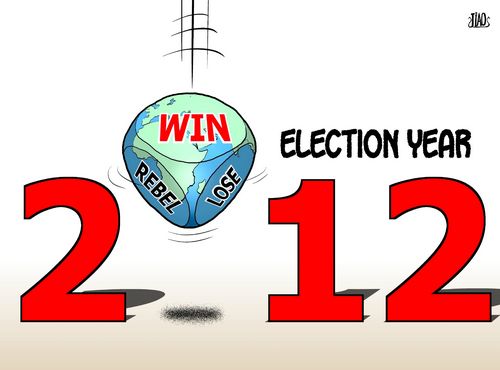Money more important than ever in US elections
- By Stuart Wiggin
 0 Comment(s)
0 Comment(s) Print
Print E-mail
China.org.cn, January 20, 2012
E-mail
China.org.cn, January 20, 2012
The United States boasts one of the most successful democratic systems in the world, though those elected to power are often constrained by the institutions of government. Despite this, many complain about the Electoral College system used to elect presidents; as candidates are able to win the presidency without gaining the majority of the popular vote. This was the case in 2000, when George Bush Jr. beat Al Gore.
|
|
|
2012 chances [By Jiao Haiyang/China.org.cn] |
Yet there is one thing that is certain, the presidential election in America, unlike many of its European democratic counterparts, commands society's and the wider world's attention. America's role in international affairs is one of the overriding reasons for outside curiosity.
However, the amount of money poured into presidential campaigns makes it hard for anybody to escape being drawn into the carnival-like proceedings, and this year's election is set to be unlike any other in regards to the issue of money.
Embarking upon an American presidential campaign is the most expensive foray in politics. Unless their candidates qualify by having matching funds, third parties are effectively shut out from the political system. That is unless the candidate has considerable personal funds or if an organized and well funded group can cover expenses. Ross Perot was the most successful of all third party candidates in 1992 when he ran a successful, self-financed campaign. His inclusion on the ballot had the most impact of all third parties attempting to gain votes in recent history, and his inclusion in the general election is often credited as the reason Bill Clinton was elected into office.
This year, money is expected to play a greater role than ever before with the rise of the so-called super PACs. The super PACs, or political action committees, are the result of a 2010 Supreme Court ruling known as Citizens United. The ruling effectively relaxed the laws on campaign financing, and 2012 is set to be the year of the super PACs' coming out party. The ruling allows for unlimited contributions and spending by independent groups operating outside of the coordination of official party campaign groups. As for how much these two groups overlap: Officially they are not allowed to, but in practice many former staff members from official campaign groups now head up the super PACs for their respective parties or candidates.
With super PACs already in motion during the Republican Presidential Race, their influence is likely to extend as funds continue to roll in over the course of the year. By the last official count in July 2011, the super PAC backing Mitt Romney's presidential campaign had raised more than US$12 million, while Obama's super PAC, Priorities USA, is aiming to raise US$100 million. Combine these figures with official campaign funding, thought to amount to over US$200 million already for Obama's re-election campaign (expected to rise to US$1 billion), and one starts to see the amazing role that cash plays in securing America's top office. As Trevor Potter, former Federal Election Commission chairman previously stated in a January edition of Time magazine, "We're suddenly entering a very different world where people with large sums of money, if they choose, are going to be able to spend it easily in ways that may buy elections."
As for the election itself, it's too early to cast predictions. Mitt Romney is the front-runner for the Republican Presidential nomination, but the Republican race has been decried from within by John Huntsman who officially withdrew from the race on January 16, stating that it had "degenerated into an onslaught of negative and personal attacks." The result is anything but a foregone conclusion.
Yet, 2012 may be the first year since 1992 for a third party candidate to make waves in a presidential race. The highly organized and well funded non-partisan group, Americans Elect, is aiming for ballot access in all 50 states in the 2012 general election. The group, funded by individual contributions, will be choosing a candidate as part of a national online vote from a pre-determined list. Depending on who will be selected, the presence of a well funded third party candidate, such as moderate Republican John Huntsman, could erode the base of one of the more established parties.
Offering people with the chance to partake in the first direct presidential nomination, the work of Americans Elect coincides with a record number of people identifying themselves as Independents - a political tag which translates into dissatisfaction with the current political climate. In a survey conducted by Gallup Poll, 40 percent of the 20,000 respondents defined themselves as Independents, compared to 27 percent for Republicans and 31 percent for Democrats. These figures should serve as a warning to the two major parties within American politics, and it is likely that the super PACs will be ramping up the image war in order to secure valuable battleground states come end of this year.
The author is a news editor at China Radio International. He graduated from Oxford University majoring in modern history and politics.
Opinion articles reflect the views of their authors, not necessarily those of China.org.cn







Go to Forum >>0 Comment(s)